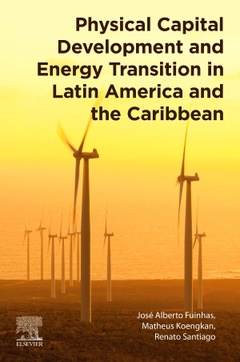Physical Capital Development and Energy Transition in Latin America and the Caribbean
Auteurs : Fuinhas Jose Alberto, Koengkan Matheus, Santiago Renato

Physical Capital Development and Energy Transition in Latin America and the Caribbean introduces the reader to applied theory and potential solutions to manage the transition from fossil energies to renewables given the resource wealth and infrastructural limitations of Latin American and Caribbean (LAC) countries. The work presents consistent empirical approaches and relevant econometric approaches grounded in case studies that offer realistic portrayals of complex multidisciplinary phenomena. It provides policymakers with the knowledge needed for economic decision-making, especially regarding the energy transition and the physical capital development in the LAC (and similar developing regions). The work concludes by road mapping future LAC physical capital investment options to promote 21st-century sustainable energy development.
1. A Brief History of the Physical Capital in Latin America and the Caribbean since the ’70s 2. The Relationship between Public Capital Stock, Private Capital Stock and Economic Growth in the Latin American and Caribbean countries: A Matter of Complementarity 3. Concentration Hurts: Exploring the Effects of Capital Stock in Latin America and the Caribbean Income Inequality 4. The Downward Trend in the Energy Intensity of Latin America and the Caribbean: Is the Region's Physical Capital Contributing to This Tendency? 5. Energy Transition in Latin America and the Caribbean Region: Initiatives and Challenges 6. The Role of Public, Private, and Public-Private Partnerships Capital Stock on the Expansion of Renewable Energy Investment in Latin America and the Caribbean Region 7. The Effect of Energy Transition on Economic Growth and Consumption of Non-Renewable Energy Sources in Countries of Latin America and the Caribbean 8. The Consequences of Energy Transition on Environmental Degradation of Latin America and the Caribbean 9. The Capacity of Energy Transition to Decrease the Deaths from Air Pollution: Empirical Evidence from Latin America and the Caribbean Countries
Matheus Koengkan is a PhD in Economics by the University of Évora. He is a researcher in the areas of Energy and Environmental Economics at Faculty of Economics, University of Coimbra, Coimbra (Portugal). He has published in international journals, such as Energy; Environmental Economics and Policy Studies; GeoJournal; Environmental Science and Pollution Research; and Environment Systems and Decisions.
Renato Santiago is a Masters (in Economics) from the University of Beira Interior in 2017. He is a researcher in the areas of sustainable and inclusive development. He has published in international journals, such as Economic Change and Restructuring; Journal of Cleaner Production; and Environmental Economics and Policy Studies.
- Analyses the macroeconomics of physical capital and energy transition in LAC countries
- Uses case studies to draw pragmatic comparative energy policy implications
- Deploys econometric techniques to address empirical approaches on energy and development economics
- Discusses the effects of the energy transition on environmental degradation
- Links energy economics and public investment management
Date de parution : 07-2021
Ouvrage de 234 p.
15.2x22.8 cm
